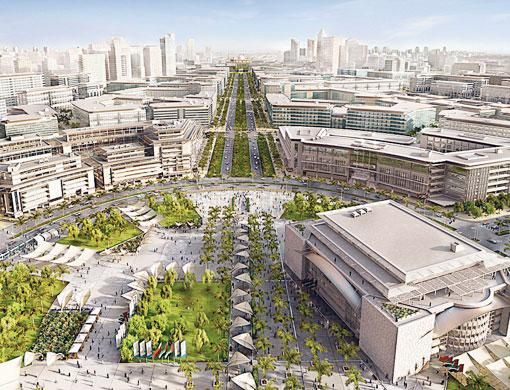Abu Dhabi: The Abu Dhabi government is gearing up to develop a new administrative district, Capital District, that will house the future government offices and residences.
Abu Dhabi Urban Planning Council (UPC) which is overseeing the project, has approved three masterplans in a meeting held in the presence of Shaikh Mohammad Bin Zayed Al Nahyan, Crown Prince of Abu Dhabi, Chairman of the Executive Council, Chairman of the Urban Planning Council.
This mirrors similar steps taken by some other countries, such as Malaysia which moved its administrative headquarters to Putrajaya - from the Kuala Lumpur downtown area. The Capital District will see a similar set-up once completed.
The masterplans - which include the Capital District, Khalifa B City and Shahama and Bahia Revitalisation Plan - are slated to transform the UAE capital into the sustainable Arab capital and a major international hub, a UPC statement said.
Once completed the 4,500-hectare Capital District, will serve as a second government and economic centre in Abu Dhabi and would eventually be a sustainable, vibrant, compact, mixed-use city of 370,000 residents.
The Capital District would comprise high density transit oriented communities, major universities, hospitals and knowledge-based employment sectors, as well as a lower density residential neighbourhood.
"At the heart of the district will be local and national government infrastructure, federal buildings, embassies and international institutions. All these will be housed within a single precinct that would ultimately manifest Abu Dhabi's role as the Federal Capital City of the UAE," it said.
Initiated by the UPC in August 2008, the Khalifa B City consists of three main components. First, a master plan for the existing neighbourhood that implements the UPC's vision of quality public spaces and community facilities.
A second master plan focuses on creating a vibrant new mixed-use area between the existing neighbourhood and the highway and the third component is the design guidelines for the development of a high quality neighbourhood that integrates into the existing neighbourhood and caters to resident's needs.
The UPC has also approved the Revitalisation Plan for the communities of Shahama and Bahia along the Abu Dhabi-Dubai highway, which was first unveiled in June last year.
This approval means that the project driven by the UPC in partnership with Emirates Foundation will stimulate growth in existing areas of the district for up to 110,000 people till the year 2030.
The project will also address the lack of community facilities, parks, shopping and housing in the area.
A new town centre with transport hub and full array of amenities will also be delivered as part of the project.
The UPC, which is the agency responsible for the future of Abu Dhabi's urban environment, is building the foundations of the Emirate's growth in a sustainable manner.
This will give rise to a totally new concept in urban planning which will make it functional and enhance the quality of life for all Abu Dhabi residents by establishing a cohesive and stable environment.
The Abu Dhabi Plan 2030 is a catalyst to the government's long-term plans of securing the emirate's social, cultural and economic growth and creating a "Next Generation Planning" approach on modern urban planning principles.
The UPC is currently developing new street design standards in accordance with the guiding principles of Plan Abu Dhabi 2030 which call for safer, more comfortable and aesthetic street environments to establish Abu Dhabi as a groundbreaking global mobility model underpinned by diversity in movement options, flexibility in destination access, efficiency in time saving and enhancement of livability.
Plan Abu Dhabi 2030's key strategic development themes provide a blueprint for the capital's long-term success centered around fostering a diversified economic development, enhancing efficient connectivity and intelligent transport links, ensuring environmental sustainability and preserving the emirate's rich unique culture.
Falah Mohammad Al Ahbabi, the UPC's general manager, highlighted that the approval of the three master plans is a major step towards the realisation of Plan Abu Dhabi 2030 and expressed his gratitude to Abu Dhabi Crown Prince and appreciation of his support to Abu Dhabi Urban Planning Council.
Al Hababi also emphasised that the expertise, commitment and world-class practice of UPC will ensure the successful implementation of the approved master plans so as to position Abu Dhabi among the top international capitals in terms of innovative and sustainable urban planning.












